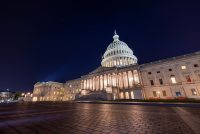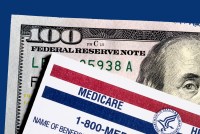Latest KFF Health News Stories
An Arm and a Leg: When Hospitals Sue Patients (Part 2)
Why do hospitals sue patients who can’t afford to pay their medical bills? On this episode of “An Arm and a Leg,” host Dan Weissmann investigates such lawsuits and covers new laws and regulations that may change this practice.
In Year 6, KFF Health News-NPR’s ‘Bill of the Month’ Helps Patients in a Changing System
In the sixth year of the KFF Health News-NPR “Bill of the Month” series, patients shared more than 750 tales of medical billing problems, and reporters analyzed more than $730,000 in charges — including more than $215,000 owed by 12 patients and their families.
Cancer Patients Face Frightening Delays in Treatment Approvals
Delaying cancer treatment can be deadly — which makes the roadblock-riddled process that health insurers use to approve or deny care particularly daunting for oncology patients.
KFF Health News' 'What the Health?': 2023 Is a Wrap
2023 was another busy year in health care. As the covid-19 pandemic waned, policymakers looked anew at long-standing obstacles to obtaining and paying for care in the nation’s health care system. Meanwhile, abortion has continued to be an issue in much of the nation, as states respond to the Supreme Court’s 2022 decision overturning the constitutional right to the procedure. This week, Rachel Cohrs of Stat, Sandhya Raman of CQ Roll Call, and Joanne Kenen of Johns Hopkins University and Politico Magazine join KFF Health News chief Washington correspondent Julie Rovner to discuss these issues and wrap up the year in health. Also this week, Rovner interviews KFF Health News’ Jordan Rau about his joint KFF Health News-New York Times series “Dying Broke.”
A New Test Could Save Arthritis Patients Time, Money, and Pain. But Will It Be Used?
Stories of chronic pain, drug-hopping, and insurance meddling are all too common among patients with rheumatoid arthritis. Precision medicine offers new hope.
‘I Am Just Waiting to Die’: Social Security Clawbacks Drive Some Into Homelessness
The Social Security Administration is reclaiming billions of dollars in alleged overpayments from some of the nation’s poorest and most vulnerable, leaving some people homeless or struggling to stay in housing, beneficiaries and advocates say.
The Market for Biosimilars Is Funky. The Industry Thinks PBMs Are To Blame
Over the past year there’s been movement to rein in the three big PBMs, which face little regulation though they help set drug prices and drug choices for 80 percent of Americans and their doctors. The House voted Dec. 11, 320-71, for legislation that would require the PBMs to change some of the ways they […]
When a Quick Telehealth Visit Yields Multiple Surprises Beyond a Big Bill
For the patient, it was a quick and inexpensive virtual appointment. Why it cost 10 times what she expected became a mystery.
Social Security Chief Apologizes to Congress for Misleading Testimony on Overpayments
Acting Commissioner Kilolo Kijakazi sent the letter days after KFF Health News and Cox Media Group reported that the agency has been demanding money back from more than twice as many people as she’d disclosed in October testimony.
‘Financial Ruin Is Baked Into the System’: Readers on the Costs of Long-Term Care
Thousands of people shared their experiences and related to the financial drain on families portrayed in the “Dying Broke” series, a joint project by KFF Health News and The New York Times that examined the costs of long-term care.
‘Until It Is Fixed’: Congress Ramps Up Action on Social Security Clawbacks
Sen. Ron Wyden (D-Ore.), chair of the Senate Finance Committee, vowed to meet monthly with Social Security officials until the problems surrounding overpayment demands are fixed.
An Arm and a Leg: When Hospitals Sue Patients (Part 1)
Some hospitals sue patients over unpaid medical bills. But is this even an effective way for hospitals to recoup lost revenue? On this episode of “An Arm and a Leg,” host Dan Weissmann speaks with medical-debt experts to explore a different solution.
Listen: What Our 2-Year-Long Investigation Into Medical Debt Reveals
An award-winning project by KFF Health News and NPR found that at least 100 million people in the United States are saddled with medical bills they cannot pay — and exposed a health care system that systematically pushes people into debt.
Watch: She Had a Home and a Good-Paying Job. Then Illness and Debt Upended It All.
A chronic health diagnosis and medical debt reordered Sharon Woodward’s life.
KFF Health News' 'What the Health?': Democrats See Opportunity in GOP Threats to Repeal Health Law
Sensing that Republicans are walking into a political minefield by threatening once again to repeal the Affordable Care Act, the Biden administration is looking to capitalize by rolling out a series of initiatives aimed at high drug prices and other consequences of “corporate greed in health care.” Meanwhile, the Supreme Court hears a case that could determine when and how much victims of the opioid crisis can collect from Purdue Pharma, the drug company that lied about how addictive its drug, OxyContin, really was. Alice Miranda Ollstein of Politico, Anna Edney of Bloomberg News, and Rachana Pradhan of KFF Health News join KFF Health News chief Washington correspondent Julie Rovner to discuss these issues and more. Also this week, Rovner interviews Dan Weissmann of KFF Health News’ sister podcast, “An Arm and a Leg,” about his investigation into hospitals suing their patients over unpaid bills.
Colorado culpa a Biden y a farmacéuticas por retrasar importaciones de medicamentos de Canadá
Los consumidores estadounidenses pagan algunos de los precios más altos del mundo por medicamentos de marca. En Canadá, el gobierno controla los precios.
Programas ponen los medicamentos sin usar en manos de pacientes que los necesitan
Recogen de centros de salud, residentes, farmacias o prisiones los medicamentos sin abrir y sin caducar que se acumulan cuando los pacientes son dados de alta, cambian de medicina o mueren, y los redistribuyen a pacientes vulnerables.
Dodging the Medicare Enrollment Deadline Can Be Costly
As open enrollment ends, many people are tuning out. They could wind up with a surprise next year: higher costs and less access to health care providers.
Colorado Blames Biden Team and Drugmakers for Delaying Canadian Imports
Colorado officials say they haven’t been able to stand up a program to import drugs from Canada because of drugmaker opposition — and the Biden administration’s inaction.
Social Security Clawbacks Hit a Million More People Than Agency Chief Told Congress
More than 2 million people a year have been sent notices that Social Security overpaid them and demanding they repay the money. That’s twice as many as the head of Social Security disclosed at a congressional hearing in October.























